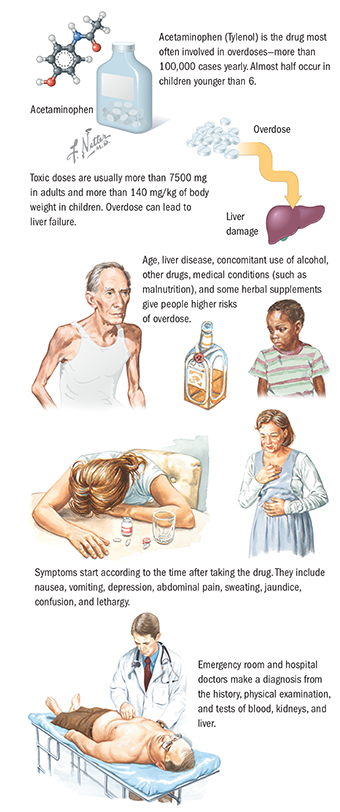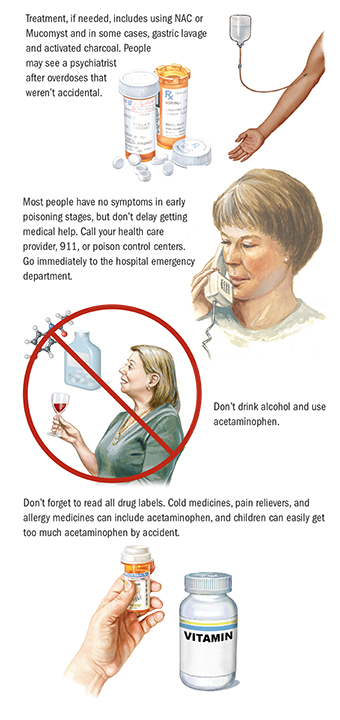
Acetaminophen or paracetamol (Tylenol) is the drug most often involved in planned and accidental overdoses in the United States. More than 100,000 cases occur yearly. Many products such as antihistamines, decongestants, and other pain relievers contain acetaminophen. Almost half of acetaminophen overdoses occur in children younger than 6. About 1 in 1000 cases leads to death, caused mainly by liver failure.
Acetaminophen usually comes in 80- to 600-mg dosages. Adults shouldn’t take more than 4000 mg daily. Children younger than 12 shouldn’t take more than 2600 mg daily. Toxic doses are usually more than 7500 mg in adults and more than 140 mg/kg of body weight in children.
The liver metabolizes about 90% of acetaminophen. A toxic intermediate from breakdown of acetaminophen can hurt liver and kidney cells. Age, liver disease, and simultaneous use of alcohol, and other drugs can give people higher risks of overdose. Medical conditions (such as malnutrition) and some herbal supplements may also lead to higher risk.
Poisoning can be divided into four phases on the basis of time after taking the drug. In phase 1 (0-24 hours), most people have no symptoms except for nausea, vomiting, and malaise. In phase 2 (24-48 hours), pain in the abdomen (belly), nausea, vomiting, and sweating may occur. Liver damage may start at this point. In phase 3 (72-96 hours), liver injury gets worse. Symptoms include jaundice (yellow skin), confusion, and lethargy. Other symptoms are irritability, appetite loss, coma, and convulsions. In phase 4 (4 days to 2 weeks), depending on the amount of overdose, the person has either recovered or is in the final stages of liver failure.
Emergency room and hospital health care provider make a diagnosis from the history, physical examination, and laboratory tests. These tests are of blood, kidney function, and liver function.

For certain blood levels, no treatment is needed. However, treatment, if needed, includes using an antidote named N-acetylcysteine (NAC) or Mucomyst. If people are seen within 4 hours of taking toxic amounts, emergency room health care provider may use activated charcoal to try to prevent absorption of acetaminophen by the gastrointestinal tract. Most people recover fully and don’t have lasting liver injury.
Referral to a psychiatrist is recommended after planned overdoses.
Contact the following sources:
Copyright © 2016 by Saunders, an imprint of Elsevier, Inc.
Ferri’s Netter Patient Advisor